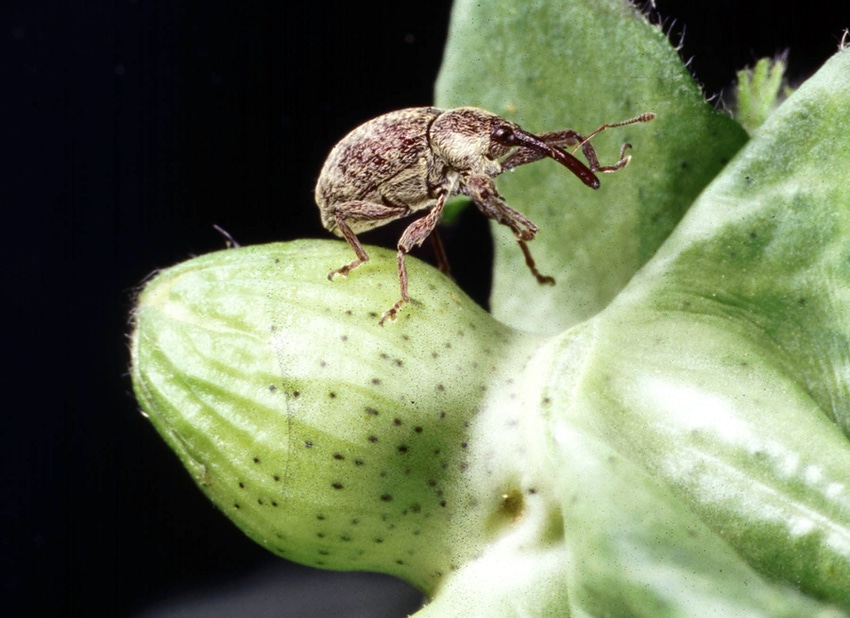
Louisiana state legislators are considering several bills to insure that $766,000 in boll weevil eradication funds are not included in a fund sweep that Gov. Bobby Jindal is proposing to help balance the state budget.Senate Bill 646, sponsored by Senate Agriculture Committee chairman Francis Thompson, D-Delhi, would move boll weevil money into either the Louisiana Agriculture Finance Authority or a bank account for safe-keeping.If the fund sweep were to proceed, the boll weevil funds would transfer to the state’s general fund on July 1, 2012.

Louisiana state legislators are considering several bills to insure that $766,000 in boll weevil eradication funds are not included in a fund sweep that Gov. Bobby Jindal is proposing to help balance the state budget.
The fund sweep is part of House Bill 822 that would divert almost $200 million, including money currently in the weevil fund, to help pay for Medicaid and other expenses.
Senate Bill 646, sponsored by Senate Agriculture Committee chairman Francis Thompson, D-Delhi, would move boll weevil money into either the Louisiana Agriculture Finance Authority or a bank account for safe-keeping.
There is also an amendment to House Bill 822 that must be passed through the Appropriations Committee that would exempt boll weevil funds from the sweep.
House Bill 1126 by state Rep. Andy Anders, D-Vidalia, also proposes to move the money to the Louisiana Agricultural Finance Authority.
If the fund sweep were to proceed, the boll weevil funds would transfer to the state’s general fund on July 1, 2012.
Louisiana Agriculture Commissioner Mike Strain hopes there will not be much pushback from the governor’s office over the multi-pronged approach to protect boll weevils funds.
“The governor has been a friend to farmers,” Strain said. “I think the financial advisors have not given a clear picture to the administration on exactly how this program works. I think the administration is starting to understand that these funds cross multiple fiscal years. The fiscal year and the crop year do not coincide.”
Jim Monroe, legislative director for the Louisiana Farm Bureau, explained that those who first proposed to move the eradication money to the general fund “looked at June 30 (the end of the fiscal year) in 2011 and said, ‘oh, there’s money in this account.’ Well, yeah, there’s money there because producers put it there to pay for the next year’s eradication program. We were pretty upset with the possibility of that money being swept into the general fund.”
Industry leaders note that the state’s boll weevil fund is different from others in the sweep in that it is collected from assessments, rather than taxes, fees or penalties.
“It’s funded by farmers. The only money for it comes from farmers,” said Ted Schneider, president of the Louisiana Cotton and Grain Association.
Tensas Parish cotton producer Jay Hardwick, who is past chairman of the National Cotton Council, said “the possibility that this money could be swept is disconcerting, especially since producers made an agreement with state government to tax ourselves to fund the program.
“It’s misguided and short-sighted to gut the program just as we’re on the verge of wiping out the boll weevil in the United States. The notion of taking this money for another use is inconceivable to me. This money was meant to help preserve an industry that provides a consistent, meaningful revenue stream to the state year after year.”
The last boll weevil caught in Louisiana was in 2010, but cotton producers continue to pay a $6 per acre monitoring fee to insure that a re-infestation of the pest does not occur.
“If you don’t monitor, it can be extremely bad,” Strain said. “We saw what happened in South Carolina (in 1995) where a re-infestation cost over $1.3 million to control.
“We can’t start back from square one. Cotton yields in Louisiana are now over 1,000 pounds an acre. A great deal of that is due to the eradication of the boll weevil. Boll weevils can devastate a crop. The cotton crop is a $250 million a year crop in Louisiana and is a $1 billion-plus industry for the economy in central and north Louisiana.
“We’re going to have to watch this very closely going through the legislative process. There are many ways to kill a bill. Currently Senate bill 646 is headed toward House agriculture and from there, we are very sure we will pass that and move it on to the House floor.
“We need to make sure that we have sufficient public pressure to keep this in the news.”
Monroe added that Jindal has agreed that boll weevil money should not be targeted, “so I think we’ve got it worked out.”
Strain was adamant that the state’s boll weevil eradication program will operate with 100 percent of its funds in the future.
“They’re not getting this money,” Strain said. “I don’t care what happens. They will not get this money, as I live and breathe.”
Strain is hopeful that the Jindal administration will come around.
“We’re going to be working with the administration. They have been good friends of the farmers. I think we can resolve this particular issue. This is the legislative process, and at the end of the day I think the people’s voices will be heard.”
About the Author(s)
You May Also Like





